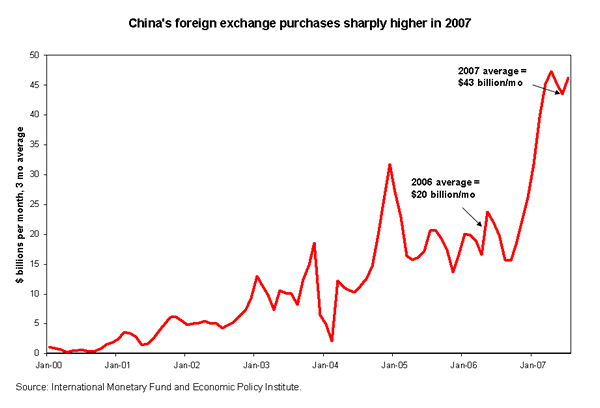China Dollar Purchases: Curbing Fluctuations in Yuan Value

China dollar purchases have come under scrutiny as the nation grapples with the implications of rising tensions in the trade war and the recent depreciation of the yuan. In an effort to maintain yuan stability, China’s government has quietly requested state banks to curb their dollar purchases, aiming to mitigate further currency devaluation. The People’s Bank of China (PBOC) has stepped in with guidance, enforcing stricter measures on dollar buying to defend the integrity of the national currency amidst market fluctuations. As U.S. tariffs continue to pose challenges, China’s economic policy is increasingly focused on stabilizing the yuan to foster a favorable trading environment. The actions taken around dollar purchases highlight a strategic pivot to safeguard the nation’s financial and economic interests during turbulent times.
In response to ongoing economic challenges, the approach of limiting dollar acquisitions has become a crucial topic in China’s financial strategy. With the yuan reaching multi-year lows, the country’s monetary authorities are taking proactive steps to ensure the stability of their currency against adverse market conditions. This monetary control stems particularly from the ongoing U.S.-China trade conflicts, which have greater implications for factors such as international trade and currency valuation. By regulating the purchase of foreign currency, China aims to navigate the complexities of global economic relations effectively, seeking not just to retain the strength of its currency, but also to protect domestic interests amid increasing external pressures. Such strategies incorporate a wider perspective on balancing exports and maintaining confidence in the financial system.
China’s Dollar Purchase Compliance Measures
In response to the ongoing trade tensions, particularly the trade war with the United States, China has officially requested banks to restrict dollar purchases. This strategy is aimed at stabilizing the yuan, which has been facing significant downward pressure amid trade-related uncertainties. By enforcing tighter controls on dollar purchases, the Chinese government hopes to mitigate speculation in the currency markets and prevent excessive influence from external factors. The request comes as state banks are being tasked with balancing the currency by engaging in active dollar sales to support the yuan’s value.
This initiative is crucial in the context of China’s broader economic policy, as maintaining a stable yuan is essential for fostering investor confidence and promoting economic growth. With the yuan experiencing multi-year lows, the People’s Bank of China (PBOC) is playing a vital role in guiding banks to mitigate risks associated with currency fluctuations. By imposing these controls, China is not only addressing immediate market conditions but also laying the groundwork for a strategic response to the prolonged trade conflict with the U.S, which has led to increasing concerns about currency devaluation.
Frequently Asked Questions
What measures is China taking to control dollar purchases amid yuan stability concerns?
China is asking state banks to curb dollar purchases to stabilize the yuan amid rising tariffs from the U.S. This involves increasing scrutiny over private dollar acquisitions to prevent speculation and uphold the currency’s value.
How does the China trade war influence dollar purchases and yuan valuation?
The ongoing China trade war has prompted the country to implement measures that limit dollar purchases as part of its strategy to prevent significant yuan devaluation while maintaining competitiveness in international markets.
What is the significance of the PBOC dollar guidance in relation to yuan stability?
The People’s Bank of China (PBOC) has issued dollar purchase guidance to state banks, aiming to halt dollar acquisitions that could lead to yuan depreciation. This guidance is critical in maintaining yuan stability amidst external pressures.
How might currency devaluation affect China’s economic policy and dollar purchasing behavior?
Currency devaluation could potentially aid China’s exports by making them less expensive internationally. However, significant devaluation poses risks to monetary stability, prompting China to closely regulate dollar purchases to mitigate these effects.
What potential risks does China face with dollar purchases amidst yuan volatility?
While moderate yuan depreciation can enhance export competitiveness, excessive dollar purchases could lead to instability in the currency market, undermining confidence and leading to negative repercussions for China’s economic policy.
| Key Point | Details |
|---|---|
| China’s Request to Banks | China has requested state banks to limit dollar purchases to stabilize the yuan. |
| Impact of U.S. Tariffs | The ongoing trade conflict has led China to prepare measures to counteract U.S. tariffs. |
| Role of the PBOC | The People’s Bank of China has informally guided banks to stop dollar purchases. |
| Recent Actions by State Banks | State banks recently began selling dollars and buying yuan to support the currency. |
| Potential Effects of Devaluation | Minor devaluation may boost exports, but sharp declines could harm market confidence. |
| Predictions by Analysts | Experts predict potential yuan devaluation and increased risk of capital flight. |
Summary
China dollar purchases are currently being curtailed as the country aims to stabilize its currency amid ongoing trade tensions. The Chinese government’s efforts to control dollar buying by state banks reflect its commitment to maintaining the yuan’s value against international pressures, particularly from the U.S. tariffs. This action demonstrates China’s readiness to defend its economic interests while navigating a complex trade landscape.




